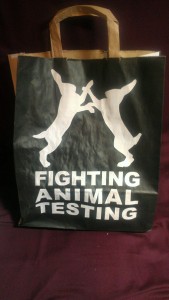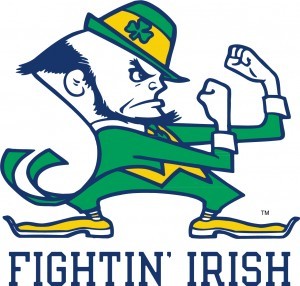Note the first: this was originally posted on amberstubbs.net, on a blog that no longer exists. Republished here for posterity, and also because I still think it's kinda funny -- AS
Note the second: I am given to understand that Lush is fully aware of the implications of their slogan, but that won't stop me from overanaylzing it for fun.
Episode 2: Fighting Animal Testing Fighting Animals
Disclaimer: I really like Lush cosmetics. Their products are really gentle, smell amazing, and they are committed to being eco-friendly. More importantly, they have a bath bomb that’s shaped like a rocket ship, and it zooms around the tub while it dissolves. (Priorities: I have them.) (Note: that bath bomb has been discontinued since I first posted this. Sadness. -- AS)
I’m not here to peddle Lush products, I just want to make it clear that the rest of this post isn’t coming from a desire to tear the company down. I just can’t ignore this any longer.
Here is a picture of a bag I recently got from Lush:
Yes, that’s a picture of two rabbits trying to smack each other, with the words “Fighting Animal Testing” underneath. Unfortunately for Lush, there are two possible interpretations here:
- “Lush is fighting against animal testing”
- “Lush is testing on fighting animals”
Awkward.
Of course, the Lush website makes it very clear that they are against using animals to test cosmetics, and no company with a PR department would ever think that “Twice the animal abuse of other companies!” would be a good marketing strategy, unless their market is Michael Vick. But the fact remains that “Fighting Animal Testing” is ambiguous.
Here’s the problem: words in English that end in -ing are usually verbs, but they can be adjectives as well, such as when a person is being described through an action they are performing (really, words ending in -ing can be other things in English too, but let’s stick to verbs and adjectives for today). For example:
- The woman is singing on stage.
- The singing woman is on stage.
These are both perfectly normal sentences that convey basically the same information: there’s a woman who is singing, and she is on a stage. In the first sentence, “singing” is the verb; in the second it’s an adjective modifying “woman”.
However, phrases are more ambiguous when the subject of a sentence is omitted, because then it’s harder to tell if the -ing word is a verb or an adjective. Often in a company slogan the -ing word will be a verb, and it’s assumed that the subject is the company itself, as in “Cingular Wireless: Raising the Bar” (more slogans). However, it’s not always true that the -ing word will be a verb. For example, I’m quite sure that Notre Dame’s “Fightin’ Irish” aren’t systematically going out and beating up people from Ireland. The fact that their mascot is a leprechaun in a fighting stance adds context that lends itself to the interpretation that “fightin’” is a description, not a verb.
So -ing words in slogans can be verbs or adjectives, depending on context. Which still leaves us with two valid interpretations of Lush’s slogan:
- Fightingverb (Animaladj Testingnoun)
- (Fightingadj Animalnoun) Testingverb
Given these, we have to look at the rest of the context of the slogan for help with the interpretation. Unfortunately, the only context is the picture of two rabbits having a slap fight. Okay, what about other, similar phrases? My husband reminded me of the phrase “live fire testing”, which is used to indicate that you’re testing (verb) with live ammunition. Putting all this together, it looks like Lush is… testing on fighting animals after all. Huh. Maybe they can get Michael Vick as a spokesman.


